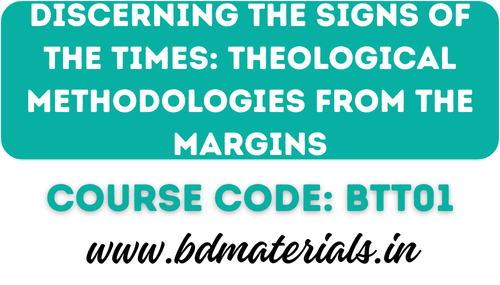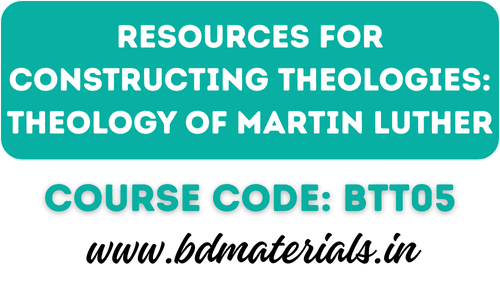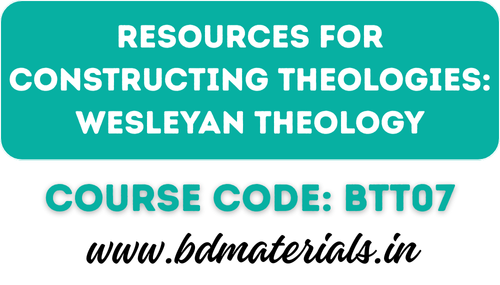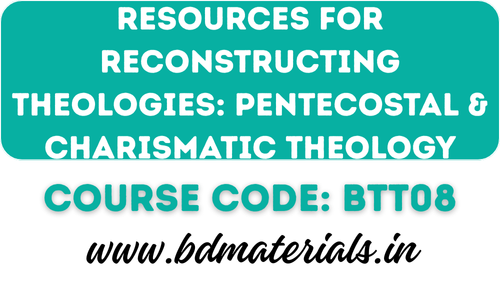Course Code: BTT15
Adivasi Theology
BD IV, Semester I, 2 Credit Hours, College Paper
Course Objectives
- To help the students to understand the Adivasi struggles in India for autonomy, survival, and self-determination, and to engage with the emerging theological constructions from the Adivasi life experiences.
- To enable the students to engage with the unique theological methods and sources of Adivasi theology, and to critically evaluate the prevailing dominant theological methods and sources.
- To facilitate the students to understand how the Gospel enters into a dialogical encounter with the socio-political contexts of Adivasis enabling the process of transformation offering life in abundance to all.
- To inspire the students to participate in the struggles of the Adivasi communities for survival and identity as a faith imperative.
- To provide ‘development-integrated-theological’ education so as to prepare the students to be the agents of social change and development side by side the traditional ministerial role.
Note
Students are expected to choose any one of the courses listed in TC 209.
Pedagogical Methods
- The course will follow lecture/seminar method. Field trips, special lectures by Adivasi leaders/scholars/theologians, audio/video presentations, etc. can also be used.
Course Requirements
- Final Examination 60%
- Internal Assessment 40%
Course Outline
- Unit 1: Historical Overview of Adivasis in India and their Struggles for Survival and Identity
- Defining the nomenclature: Adivasi.
- Who are the Adivasis in India.
- A historical overview of various theories on Adivasi race concerning their origin, migration, and settlement in their present habitats.
- The impact of Christianity on Adivasis.
- Adivasi alienation from Jal, Jangle and Jamin (water, forest, and land).
- Adivasi struggles for selfhood and survival.
- Human rights violations, state terror, and “extremist” movements.
- Mining and its ecological and health implications.
- Autonomy and self-rule.
- Unit 2: Adivasi Theology: A Contextual Theology
- Why Adivasi Theology?
- What is Adivasi Theology?
- Critical engagement with the dominant strands of Indian Christian Theology.
- Methodological issues in Adivasi theology: definition, nature and orientation, sources, and scope.
- Bible and Hermeneutics in Adivasi theology.
- Adivasi theology and other contextual theologies such as Dalit theology and Tribal theology.
- Adivasi theology as an Indian Christian theology.
- Unit 3: Socio-Cultural Mediations/Considerations
- Adivasi resilience against invading and colonial forces.
- Unit 4: A Prolegomena of Adivasi Theology
- Ingredients of an Adivasi theology—Sources and epistemology.
- Major theological themes in Adivasi theology—God, the Creator, Christology, Pneumatology, Theological Anthropology, Sin and Salvation, Land and Earth, Ancestors, Eschatology, Christian faith.
- Adivasi spirituality.
- Unit 5: Towards an Adivasi Ecclesiology
- Characteristics of an Adivasi Church.
- Mission and Ministries, Worship, liturgy, rituals and proclamation.
- Church and the Adivasi struggles for survival and identity.
- Pastoral care and ministry in the Adivasi context.
Required Reading
- Verma R.C., Indian Tribes through the Ages, New Delhi: Government of India Press, 2003.
- Thomas M.M. (ed.), Tribal Awakening (reprint), Bangalore: CISRS, 1983.
- Chhungi Hrangthan (Ed), Theologizing Tribal Heritage: A Critical Re-look, CWM/ISET-EGC/PCI/ISPCK, 2008.
- Kujur J.M & Minz Sonajharia (Ed), Pearls of Indigenous Wisdom, Bangalore: ISI (Delhi)/CISRS, 2007.
- Munda Ram Dayal (Ed), Indigenous and Tribal Solidarity, Delhi: ICITP, 1997.
- Mundu John B., The Ho Christian Community: Towards a New Self-Understanding as Communion, Delhi: Media House, 2003.
- Pereira Francis, The Faith Tradition of the Kunrukhar (Oraons), Delhi: ISPCK, 2007.
Suggested Reading
- Fusch Stephan, The Aboriginal Tribes of India, Delhi: Macmillan Company of India, 1973.
- Roy, S.C., Mundas and Their Country, Ranchi: Man in India Office, 1912.
- Keshri B.P., History of Chhotanagpur: Some sources, some contexts (Hindi edition), Ranchi: William Carey Study and Research Institute, 1979.
- Banerjee Mangovind, A Historical Outline of Pre-British Chotanagpur (reprint), Ranchi: Educational Publications, 1993.
- Munda R.D. (Ed.), Indigenous and Tribal Solidarity (souvenir), Delhi: Indian Confederation of Indigenous and Tribal People, 1997.
- Areeparampil Mathew, Struggle for Swaraj: History of Adivasi Movement in Jharkhand, Chaibasa: Tribal Research and Training Centre, 2002.
- Sengupta N. (Ed.), Fourth World Dynamics: Jharkhand, Delhi: Authors Guild Publications, 1982.
- Singh S.K., Birsa Munda and his Movement (1874-1901), Calcutta: Oxford University Press, 1983.
- Areeparampil Mathew, “Industries, Mines and Dispossession of Indigenous Peoples: The Case of Chotanagpur,” Social Action, Vol. 38, New Delhi: Indian Social Institute, 1988.
- Bijoy, C.R, “The Political Imperative of the Adivasi Question,” Religion and Society, Bangalore: CISRS, Vol. 38, 1991.
- Fernandes Walter, “Search for Tribal Identity during the British Raj,” Religion and Society, Vol. 38, No. 3/4, Bangalore: CISRS, 1991.
- Munda Ram Dayal, “Dispossession and Displacement of Tribal People through communication manipulation with reference to Jharkhand,” Religion and Society, Vol. 38, Bangalore, 1991.
- Roy Burman B.K., “Who are the Indigenous and Tribal People of India?” Religion and Society, Vol. 38, No. 3/4, Bangalore: CISRS, 1991.
- Rayan Samuel, “The ‘How’ of Third World Theologies”, in J. Russel Chandran (ed), Third World Theologies in Dialogue: Essays in Memory of D.S. Amalorpavadass, Bangalore: EATWOT, 1991, pp. 42-46.
- Puthaangady Paul (Ed), Towards Indian Theology of Liberation, Bangalore: ITA & NBLC, 1986.
- Abraham K.C. (Ed), Third World Theologies: Commonalities and Divergences, New York: Orbis, 1994.
- Shiri Godwin (Ed), “Tribal Concerns”, Religion and Society, Vol. 50, No. 3, Bangalore: CISRS, 2005.
- Shiri Godwin (Ed), Contextualization: A Re-reading of M.M. Thomas, Bangalore: CSS/CISRS, 2007.
- Gutierrez Gustavo, A Theology of Liberation, Maryknoll: New York, 1973.
- Nehring Andreas (Ed), Prejudice: Issues in Third World Theologies, Chennai: Gurukul, 1996.
- Thanzawa K, Theology of Community: Tribal Theology in Making, Aizwal: Academy of Integrated Christian Studies, 2004.
- Wilfred Felix, From the Dusty Soil (Asian Theological series, Vol. 4), Madras: Department of Christian Studies, Madras University, 1995.
- Keitzar Renthy, “Hermeneutics in Primal Vision vis-à-vis Hermeneutics in Christian Tradition”, Gurukul Journal of Theological Studies, Vol. 5, Chennai: Gurukul, 1994.
- Hembrom Timothy, “Ministry and Mission from a Primal Perspective”, Gurukul Journal of Theological Studies, Vol. 5, Chennai: Gurukul, 1994.
- Minz Nirmal, “In Search of Roots: A Tribal Perspective”, Religion and Society, Vol. 41, No. 1, Bangalore: CISRS, 1994.
- Thanzauva K, Transforming Theology – A Theological Basis for Social Transformation, Bangalore: Asian Trading Corporation, 2002.
- Minz Nirmal, “Cultural Identity of Tribals in India”, Social Action, Vol. 43, No. 1, Delhi: Indian Social Institute, 1994, pp. 21-25.
- Sharma K.L., “Jharkhand Movement: The Question of Identity and Sub-Nationality”, Social Action, Vol. 40, No. 4, Delhi: ISI, 1990, pp. 370-381.
- Fernandes Walter, “Search for a tribal Identity during the British Raj”, Religion and Society, Vol. 38, No. 3/4, Bangalore: CISRS, 1991, pp. 27-33.
- Fernandes W & Roy Choudhury A., “Search for a Tribal Identity: The Dominant and the Subaltern”, Social Action, Vol. 43, No. 1, 1993, pp. 8-19.
- Praveen PS, Perumalla. “Land Struggles and the Indian National Movement: Adivasi and Dalit Experiences,” in Eapen, Viji Varghese and P. Mohan Larbeer (ed) Kairos-Palestine: An Indian Reflection (Bangalore: BTESSC, 2012), pp. 120-131.
- Praveen PS, Perumalla. “The Million March 2011 and The Telangana Movement” in Rajkumar, Vincent (ed) Theologizing in India Today: Interpreting the Signs of Time (Bangalore: CISRS, 2012), pp. 30-38.
- Taylor John B (Ed), Primal World Views: Christian Involvement in Dialogue with Traditional Thought Forms, Ibadan: Daystar Press.
- Sen Geeti (Ed), Indigenous Vision: People of India – Attitude to the Environment, New Delhi: Sage Publication, 1992.
- Ekka Alex, “Land and Tribal Identity”, in Land and Tribal World Views, Ranchi: Regional Theology Centre, 2009.
- Hoam Gabriel, Contemplation of a Tribal Mind, California: New World Library, 1996.
- Hoffmann J.B., Encyclopedia Mundarica (Volumes 1-9), Patna: Government Press.
- Jai Adivasi, A Political Reader on the Life and Struggle of Indigenous Peoples in India, Solidarity Action Research.
- Longchar A. Wati (Ed), Encounter between Gospel and Tribal Culture, Jorhat: Tribal Study Centre, ETC, 1999.
- Ponraj S.D., Tribal Challenge and Church’s Response, Madhupur: Mission Educational Books, 1996.
- Vashum, Yangkahao. Dalit-Tribal Adivasi Theological Interface – Towards Justice and Peace (New Delhi: Centre for Dalit Studies, 2011). Co-edited with Monodeep Daniel.
- Victus, Solomon. “Eco-Theology and Scriptures: A Revisit of Christian Responses,” New Delhi: Christian World Imprints, 2014.
Friendly Note
Bachelor of Divinity Materials is your one-stop resource for comprehensive Biblical studies, designed to support students pursuing a Bachelor of Divinity (B.D.) and other theological courses. Our website is a dedicated platform that provides access to the full syllabus of the Bachelor of Divinity course along with detailed answers, ensuring a thorough understanding of every subject and topic covered in your curriculum.
Here, you will find a vast collection of assignments, study guides, articles, and research papers meticulously curated to assist you in excelling academically. The platform also features a rich selection of theological books, journals, and resources spanning diverse subjects such as Old Testament, New Testament, Systematic Theology, Church History, Biblical Languages, and Pastoral Studies.
To make your learning experience convenient and accessible, we offer downloadable PDFs of study materials, including books and journals, allowing you to learn anytime, anywhere. Whether you are preparing for exams, writing assignments, or conducting in-depth research, these resources are tailored to meet the needs of both students and scholars in biblical and theological studies.
With a commitment to empowering theological learners, our mission is to provide high-quality, authentic, and practical study materials. Explore Bachelor of Divinity Materials to grow spiritually, academically, and intellectually as you deepen your understanding of God’s Word and Christian doctrine. This platform is a valuable resource for aspiring ministers, pastors, and anyone dedicated to the study of theology and biblical teachings.






